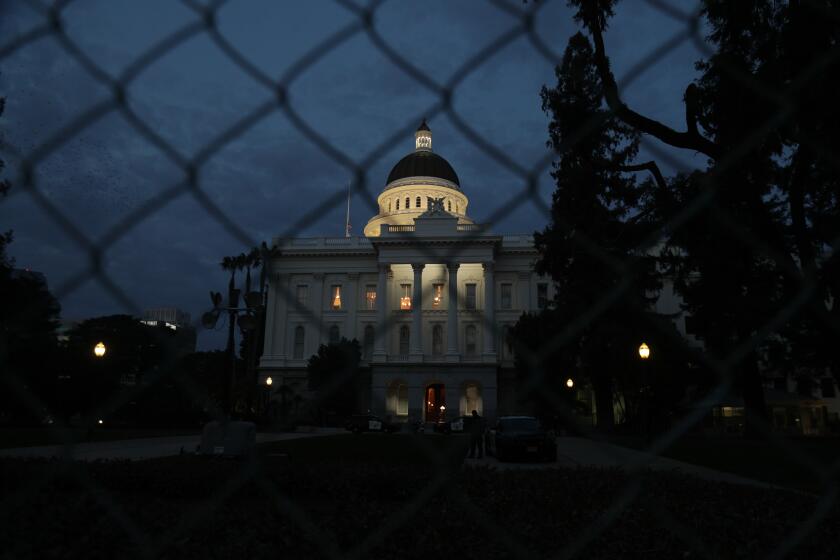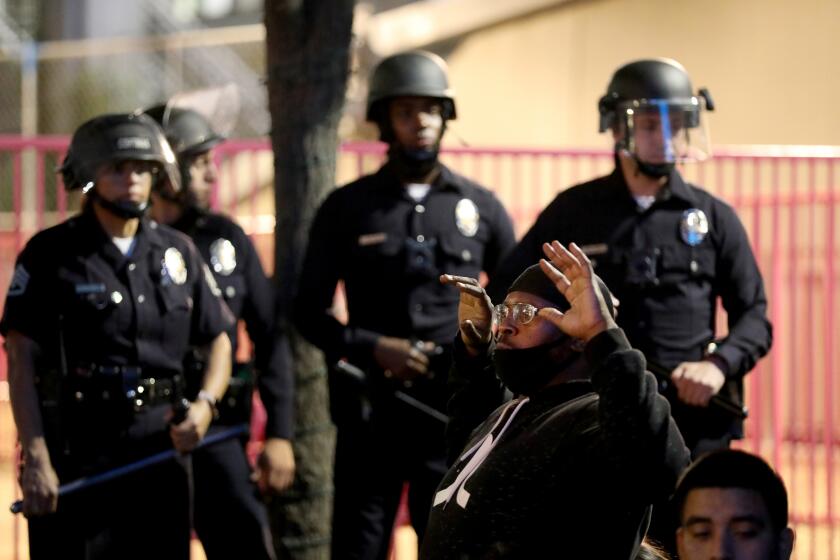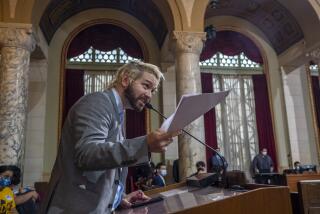Editorial: L.A. city attorney’s attempt to weaken public records law is harmful and wrong

- Share via
Fresh off an embarrassing attempt to claw back Los Angeles police officer photos the city released in response to a public records request, City Atty. Hydee Feldstein Soto has launched another misguided effort — this time to weaken the state’s bedrock government transparency law.
This is not a promising start for the new city attorney.
The California Public Records Act ensures that the public has a right to know how government agencies and their employees are conducting the public’s business. It’s an essential tool for journalists, academics and activists, but not an all-powerful one. The law gives government agencies the discretion to deny records requests when the release of information would be an invasion of personal privacy for which there is no overriding public interest in disclosure.
Feldstein Soto has drafted legislation that could give California’s government agencies far more power to deny records requests that seek “images or data that may personally identify an individual” whose information the agency collects, such as its employees.
Citizens have a right to know what’s going on inside their government. Legislation would require agencies to hold onto records for at least two years.
Lawyers who have looked at the two-page draft said the language is so broad it would let agencies refuse to provide even the names of government employees and officials.
That would “completely gut the Public Records Act,” Melanie Ochoa, an attorney who is the director of police practices for the American Civil Liberties Union of Southern California, told Times reporter Laurel Rosenhall.
Feldstein Soto called the proposal “a minor tweak” to the Public Records Act. Her intention, she said, is not to withhold the names of public employees or government officials, and she is willing to change the draft to make that clear. Her goal, she said, is to give agencies explicit permission to refuse the release of photographs or biometric data, such as fingerprints.
But that’s a big change. The law already addresses the release of personal information, and agencies have discretion to withhold employee photographs if there is a compelling reason that outweighs the public interest in disclosure. Feldstein Soto’s language would give public agencies blanket authority to reject requests for photographs — even for elected officials or public employees charged with crimes.
This proposal, of course, was inspired by the records request that led to the release this year of pictures and data of more than 9,300 police officers, which was turned into an online database with officers’ names, photos, ethnicity, rank, date of hire, division/bureau and badge numbers. The Los Angeles Police Department provided the photographs and data but mistakenly included undercover officers.
The ties that bind elected officials to police unions must be broken. District attorneys and other elected prosecutors should reject donations and endorsements from law enforcement labor groups, because union support compromises a prosecutor’s independence and clouds the decision over whether and when to criminally charge excessive force and other police misconduct.
Feldstein Soto sued the journalist with Knock LA, a news website, who filed the records request and the Stop LAPD Spying Coalition, which produced the database. Her office wanted the court to order the groups to return the images of officers in “sensitive roles,” take the images off the internet and forgo publishing them in the future — an effort legal experts called an obvious violation of the 1st Amendment and well-established protections for journalists. The Los Angeles Times was part of a coalition of media groups that denounced the lawsuit, which was ultimately rejected by a judge, who ruled the city had not provided evidence that the released photos included undercover officers.
Feldstein Soto said she wants to restrict disclosure of employee photos and information because police officers, along with other public employees, have become targets for harassment just for doing their jobs. There have been reports in California and across the country that public personnel — health officials, election workers, school board members — increasingly face threats and intimidation in the course of their work. But weakening public transparency is not going to reverse that trend, nor will it allow the kind of public oversight and accountability that ultimately bolsters trust in government.
The second part of Feldstein Soto’s proposal is also deeply concerning. She wants to let agencies block the release of information that could identify someone experiencing homelessness or receiving government services, as well as information about where and how homeless services are being provided.
Feldstein Soto said, for example, that releasing the names and addresses of hotels being used as part of Mayor Karen Bass’ Inside Safe temporary housing program could allow pimps and drug dealers to find people who moved off the streets. But that information is hardly a secret at encampment sites. Are drug dealers suddenly filing Public Records Act requests to find hotel locations? No.
But here’s what blocking that information will prevent: any public evaluation of the quality, location or ownership of the hotels being used. The public won’t be able to discern whether the hotels are concentrated in some communities and absent in others. The proposal would let cities refuse to provide basic information about contractors hired to provide homeless housing, benefits and services — cloaking in secrecy the many millions of dollars spent each year to address the crisis.
Feldstein Soto has asked legislators to turn her proposal into bill, but so far there are no takers. Good. Los Angeles and California have many challenges. Too much transparency is not one of them.
More to Read
A cure for the common opinion
Get thought-provoking perspectives with our weekly newsletter.
You may occasionally receive promotional content from the Los Angeles Times.












